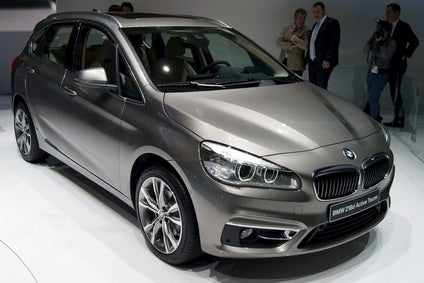The sun shone eventually on the automotive industry at this week’s Geneva show but there are still a lot of dark clouds hanging over Europe.
As bullish as the industry was about five straight months of sales growth in the region, sales are nowhere near where they were pre-economic recession.
This was put starkly into perspective by Fiat Chrysler CEO Sergio Marchionne who pointed out that the annual total last year is still 3m short of where they were in the mid-2000s.
Detecting a lack of a sharp intake of breath at his press conference, he said: “Let me repeat that, 3m – that’s the equivalent of 10 or 12 car factories.” His point was that, despite a number of car plants closing, there is still a long way to go in terms of aligning production with demand.
But increasing sales are a good thing, surely? UK executives were pleased to see even the slightest recovery in sales in mainland Europe because it means that carmakers will stop using Britain, the region’s star performer, as an opportunity to boost their sales along with all the discounting that goes with that.
Discounts are good for car buyers of course, but not great for the automakers’ bottom lines. Marchionne described it as unsustainable and claimed that Fiat, Ford, General Motors and PSA Peugeot Citroen all continue to lose money in Europe. No wonder they concentrate on China.
But there are exciting developments for the future, and particularly for the planet, and the slow roll out of fuel cells gather momentum. Yes, there’s no hint of an infrastructure yet, and yes, they would cost a marketing director’s ransom but the technology is ready, they’re great to drive and the packaging gets tidier and tidier: witness Hyundai’s Intrado concept.
Toyota turned a large part of its press conference over to what it is doing with fuel cells and Honda is among the carmakers looking at small-scale hydrogen fuel cell vehicles from next year although big volume numbers will not start ramping up until 2020, according to Thomas Brachmann, chief project engineer for powertrain technology.
There are still a great many hurdles to overcome, not least the highly important issue of quality, not just in the fuel cell system but with the whole refilling infrastructure.
“The quality of our vehicles is a given but with a new technology such as this we have to give it time to achieve the levels of quality and reliability that we want,” he said.
There is also some educating to be done added Brachmann: “There is still a misunderstanding about hydrogen which people fear can explode but we need to demonstrate better how safe it is and also how green it is. It is another version of an electric vehicle with a much, much better range, it is totally sustainable and emits only water.”
Back to the here and now, it would be great if the next Mazda 2 looks substantially similar to the Hazumi concept, the Mercedes S-Class coupe is stunning, and the Kia GT4 Stinger is just as convincing in Europe as it was in the US at the Detroit show. The Koreans say they will launch a rear-drive sports car in 2016. Let’s hope this is it. But the star car of Geneva? Based on the number of people likely to be clamouring for one, we’d pick the BMW 2 Series Active Tourer.







